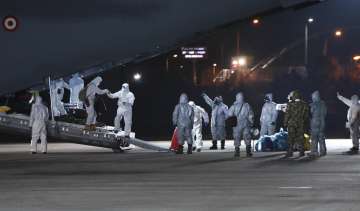How Coronavirus threatens global economy
With travel restrictions and business closures aimed at stopping the spread of a new virus that has killed more than 300 people in China, the situation could end up causing ripple effects that harm the global economy, experts say.

Travel restrictions and business closures aimed at stopping the spread of a new virus that has killed more than 300 people in China could end up causing ripple effects that harm the global economy, experts say.
“When you stop planes and ships, trains and motor vehicles from moving, it starts to shut down the economy — and that can have a cascading effect throughout society,” Dr Eric Toner, senior scholar at the Johns Hopkins Center for Health Security, said Saturday after multiple airlines announced that they would suspend or cut back on flights to and from China, and several countries, including the U.S. imposed travel restrictions.
“And it’s not just airline pilots who get out of work, I mean, it’s you know, it’s everybody that they depend on.”
Not just airlines, Apple stores, other businesses also shut down
It's not just airlines that have cut back on business in China. Apple Inc. announced Saturday that it was temporarily close all of its offices and its 42 stores in mainland China. Google, Amazon and Microsoft previously announced plans to temporarily shutter offices, and Starbucks and McDonald’s have closed some chains.
Apple said it was acting “out of an abundance of caution and based on the latest advice from leading health experts.” Its stores will be closed until February 9.
Apple's decision could harm economy, itself
Toner said Apple's decision could also be harmful to the economy and Apple itself, though he noted that many companies, including airlines, are trying to protect their employees.
Toner led a summit in October with World Economic Forum and the Bill and Melinda Gates Foundation to discuss the negative impacts of trade and travel restrictions during a pandemic. In a paper that came out of that meeting, the Johns Hopkins Center for Health Security concluded that “fear and uncertainty experienced during past outbreaks, even those limited to a national or regional level, have sometimes led to unjustified border measures.”
US, Australia, Singapore, Japan imposed travel restrictions
The U.S., Australia, Singapore and Japan have imposed travel restrictions and Vietnam suspended all flights to China. U.S. officials pointed to how quickly the virus has spread around the globe as justification, although world health officials have warned against such measures.
At least 24 countries have reported cases of the new virus, which is from the coronavirus family.
Coronavirus outbreak: India airlifts 323 more citizens, 7 Maldivians from China's virus-hit Wuhan
India on Sunday airlifted the second batch of 323 stranded Indians and seven Maldivian citizens from China's coronavirus-hit Wuhan city, taking the total number of people evacuated to 654, officials said. Air India's jumbo B747 made two flights to Wuhan city - the ground zero of the coronavirus epidemic that has killed 304 people and infected 14,380 others.
As coronavirus claims over 300 lives, China hit by dangerous H5N1 bird flu outbreak
With increasing coronavirus death toll, China has been hit by another dangerous epidemic. The Chinese Agriculture Ministry on Sunday confirmed the outbreak of H5N1 bird flu in the Hunan province. They, however, also confirmed that no human exposure has yet been registered.
"An outbreak of highly pathogenic H5N1 avian influenza occurred at a farm in the Shuangqing district of Shaoyang city, Hunan province", a ministry statement said.
(With inputs from AP)
ALSO READ: Second positive case of Coronavirus reported in Kerala